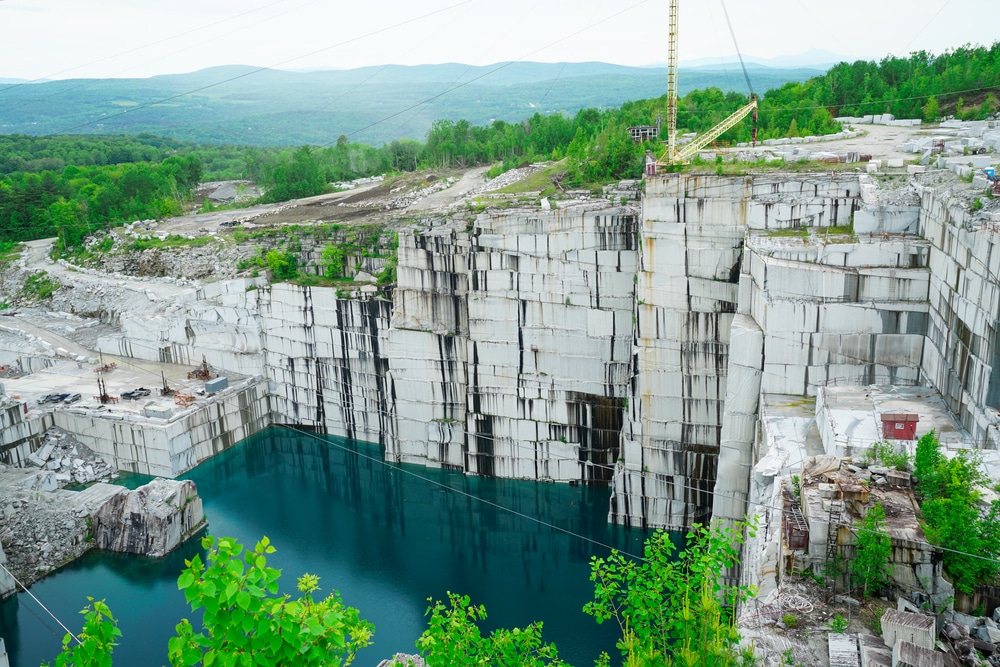Unearthing the Rich Background and Sustainable Practices of Granite Quarrying
As we stand on the precipice of uncovering the detailed tapestry of granite quarrying, a journey via time exposes not simply the physical act of extracting stone but likewise the cultural and historic significance woven into the very material of this practice. From the ancient beginnings that laid the structure for contemporary quarrying techniques to the sustainable practices that are shaping the future of this market, each carve mark on granite surfaces tells a story waiting to be unearthed (granite quarries in south africa). The tradition of granite quarrying stretches much beyond plain extraction; it is a testimony to human resourcefulness, resilience, and the long-lasting allure of this impressive stone
Ancient Beginnings of Granite Quarrying
Dating back to old worlds, the method of quarrying granite has been an important part of human history and architectural improvement. The earliest proof of granite quarrying go back to old Egypt, where massive pyramids and intricate sculptures were crafted from this long lasting rock. The Egyptians utilized primitive devices to remove granite blocks from quarries, showcasing the relevance of this product in their significant constructions.
Progressing in history, the Greeks additionally made substantial payments to the quarrying of granite. The Greeks used granite in various architectural wonders, such as holy places and statues, showing their skill in shaping and carving this sturdy stone. The Romans even more refined the techniques of quarrying granite, utilizing sophisticated tools like chisels and hammers to remove and form granite for their famous frameworks.
With the centuries, the method of quarrying granite has progressed, with modern technologies boosting performance while keeping the ageless charm of this all-natural rock - granite quarries in south africa. From ancient human beings to contemporary home builders, the tradition of granite quarrying remains to form our globe
Evolution of Quarrying Techniques
The evolution of quarrying strategies has actually been marked by a continuous progression towards better performance and accuracy in drawing out granite. From the fundamental approaches used by our forefathers to the sophisticated innovations used in contemporary quarrying operations, the sector has actually gone through considerable innovations. Early quarrying strategies entailed manual work with basic tools such as blades, hammers, and wedges to extract granite blocks from the planet. As worlds proceeded, strategies like fire-setting and primitive nitroglycerins were introduced to assist in the removal process.
In more recent times, the advent of equipment changed the quarrying sector, allowing much faster extraction rates and enhanced performance. Technologies such as diamond cable saws, high-pressure water jets, and pneumatic drills have come to be standard in modern quarries, enabling precise cutting and reduced waste. Moreover, innovations in computer-controlled devices and 3D modeling have actually maximized quarrying procedures, resulting in minimal environmental influence and improved sustainability practices. As the need for granite continues to increase, the development of quarrying methods remains integral to meeting sector needs efficiently and sustainably.
Social Value of Granite
Granite click here for more holds an extensive social value throughout numerous human beings due to its enduring presence in building work of arts and admired monoliths. From the magnificent pyramids of Egypt to the elaborate makings of the Angkor Wat holy place in Cambodia, granite has been a material of choice for expressing majesty and durability in cultural heritage. In ancient Rome, granite columns adorned temples and public structures, signifying toughness and durability. The social value of granite prolongs past its physical characteristics; it embodies durability, security, and eternity, making it a symbol of withstanding legacies and practices.

Lasting Practices in Quarrying
In the middle of the rich background of granite quarrying and its social significance exists a growing emphasis on sustainable techniques within the market. As environmental awareness and issues regarding resource deficiency have heightened worldwide, the quarrying market has significantly welcomed sustainable approaches to lessen its effect on the atmosphere and surrounding neighborhoods.

Furthermore, improvement and rehabilitation of quarry sites post-extraction are important to sustainable techniques. By bring back quarried locations to a natural or useful state, such as developing wild animals environments or recreational spaces, quarriers can balance out the environmental footprint of their procedures and add positively to the regional environment.
Heritage of Granite Quarrying
With a historical background steeped in workmanship and commercial progress, what enduring effect has granite quarrying left on the landscape of contemporary culture? The heritage of granite quarrying goes beyond mere removal methods; it has formed architectural wonders, urban landscapes, and find more information social heritage worldwide. The durable nature of granite has made it a preferred selection for monuments, buildings, and facilities, standing as a testimony to the skill and creativity of quarry workers throughout generations.
Furthermore, the financial impact of granite quarrying can not be forgotten. The industry remains to provide employment possibility and drive regional economic situations in areas where granite removal prevails. It has likewise spurred technical developments in quarrying methods and equipment, bring about much more reliable and lasting methods.
In terms of sustainability, the tradition of granite quarrying consists of efforts to minimize ecological impacts with recovery jobs and liable source monitoring. By stabilizing financial rate of interests with environmental stewardship, the industry aims to make sure that future generations can remain to profit from this enduring natural deposit.
Final Thought

Comments on “The Covert Gems: Checking Out Granite Quarries in South Africa”